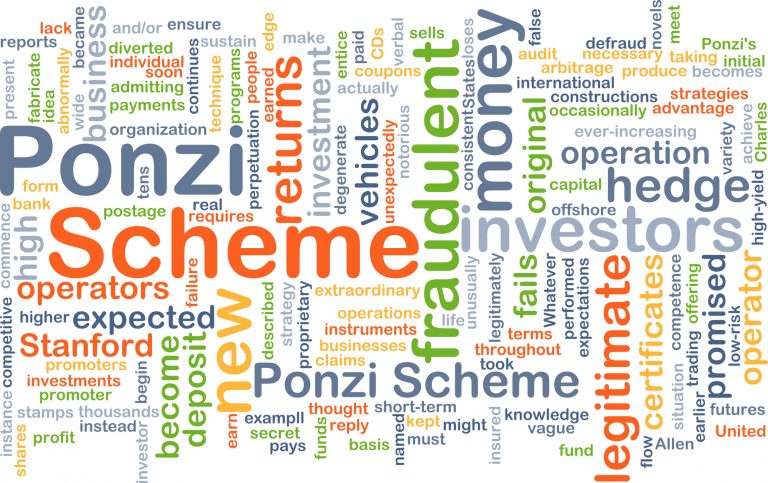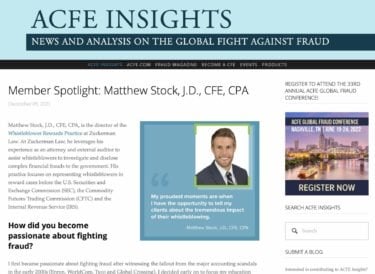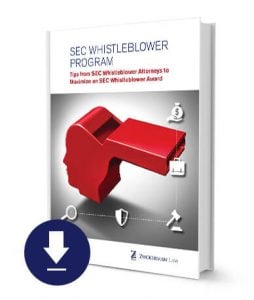Ponzi Schemes and the SEC Whistleblower Program
More than two decades have passed since the collapse of Bernard Madoff’s multibillion-dollar Ponzi scheme, which played a major role in prompting Congress to enact the SEC Whistleblower Program. In particular, a whistleblower named Harry Markopolos reported the Ponzi scheme to the SEC for nearly a decade, and his warnings were largely ignored.
In order to avoid this misstep in the future, the Dodd-Frank Act created the SEC Whistleblower Program to incentivize future whistleblowers with specific, timely, and credible information about federal securities laws violations (e.g., multibillion-dollar Ponzi schemes) to report to the SEC.
Since the inception of the program in 2011, the SEC received more than 100,000 whistleblower tips, some of which have enabled the SEC to order more than $6 billion in sanctions. In exchange for these valuable tips, the SEC’s Office of the Whistleblower has paid, to date, more than $2 billion in awards to whistleblowers.
Our multi-disciplinary leading SEC whistleblower practice has helped whistleblowers obtain awards for reporting Ponzi schemes and other investment fraud schemes. And our clients’ SEC whistleblower tips have helped the SEC halt more than $1 billion in fraudulent investment schemes.
If you have original information about fraud, contact the Director of our SEC whistleblower practice at [email protected] or call our leading SEC whistleblower lawyers at (202) 930-5901 or (202) 262-8959. All inquiries are confidential and we can help you report anonymously and earn an SEC whistleblower reward.






Recently the Association of Certified Fraud Examiners published a profile of SEC whistleblower lawyer Matt Stock’s success working with whistleblowers to fight fraud:
SEC Whistleblower Program
Under the SEC Whistleblower Program, the SEC will issue awards to whistleblowers who provide original information, including information about Ponzi schemes, that leads to successful enforcement actions with total monetary sanctions in excess of $1 million. A whistleblower may receive an award of between 10% and 30% of the total monetary sanctions collected. If represented by counsel, a whistleblower may submit a tip anonymously to the SEC.
In its short history, the SEC Whistleblower Program has had a tremendous impact on securities enforcement and has been replicated by other domestic and foreign regulators. Since 2011, the SEC has received an increasing number of whistleblower tips in nearly every fiscal year (FY). In FY 2024, the SEC received nearly 25,000 whistleblower tips and awarded over $225 million to whistleblowers. The largest SEC whistleblower awards to date are:
- $279 million SEC whistleblower award (May 5, 2023)
- $114 million SEC whistleblower award (October 22, 2020)
- $110 million SEC whistleblower award (September 15, 2021)
- $104 million SEC whistleblower award (August 4, 2023)
- $98 million SEC whistleblower award (August 23, 2024)
- $50 million SEC whistleblower award (April 15, 2021)
The uptick in received tips, paired with the sizable awards given to whistleblowers, reflects the growth and continued success of the whistleblower program. See some of the SEC whistleblower cases that have resulted in large awards.
Whistleblowers Aid the SEC in Identifying and Halting Ponzi Schemes
According to a speech by the former Director of the SEC’s Division of Enforcement, whistleblower tips have greatly aided the SEC in identifying and halting Ponzi schemes. For the past decade, the SEC Office of the Whistleblower has consistently received a significant number of tips related to offering frauds, such as Ponzi, or Ponzi-like, schemes:
- FY 2015: 16% of whistleblower tips
- FY 2016: 15% of whistleblower tips
- FY 2017: 18% of whistleblower tips
- FY 2018: 20% of whistleblower tips
- FY 2019: 13% of whistleblower tips
- FY 2020: 16% of whistleblower tips
- FY 2021: 16% of whistleblower tips
- FY 2022: 17% of whistleblower tips
- FY 2023: 19% of whistleblower tips
- FY 2024: 21% of whistleblower tips
As noted in the SEC’s speech, these schemes can be difficult to detect until it is too late. As such, whistleblower tips have proven to be a valuable resource for the SEC in its efforts to combat Ponzi schemes and protect investors, especially retail investors who are often the largest class of victimized investors in these schemes.
Red Flags for Identifying Ponzi Schemes
Ponzi schemes frequently share underlying traits. When seeking to identify a potential Ponzi scheme, whistleblowers should consider the following red flags:
- Promises of high investment returns with little or no risk;
- Regular, positive returns regardless of market conditions;
- Investments that are not registered with the SEC or an appropriate state regulator;
- Unlicensed individuals or unregistered firms;
- Secretive or complex strategies for which investors cannot get complete information;
- Lack of paperwork; inaccessibility to information about an investment in writing; and
- Difficulty receiving payment; promises of “rolling over” investments and promises for higher returns in the future, on the amount rolled over.
Recently, fraudsters have begun to use promissory note scams to raise money from investors in Ponzi schemes. Also, an SEC investor alert warns of the rise in Ponzi schemes using virtual currencies.
Report a Ponzi Scheme and Earn an SEC Whistleblower Award
To report a Ponzi scheme and qualify for an award under the SEC Whistleblower Program, the SEC requires that whistleblowers or their attorneys report the tip online through the SEC’s Tip, Complaint or Referral Portal or mail/fax a Form TCR to the SEC Office of the Whistleblower. Prior to submitting a tip, whistleblowers should consult with an experienced whistleblower attorney and review the SEC whistleblower rules to, among other things, understand eligibility rules and consider the factors that can significantly increase or decrease the size of a future whistleblower award.
SEC Targets Ponzi Schemes
The recent increase in whistleblower tips related to Ponzi schemes, combined with the SEC’s focus on protecting retail investors, has led to the SEC bringing charges against several large Ponzi schemes, including:
- A Ponzi scheme that raised more than $1.2 billion from thousands of retail investors.
- A Ponzi scheme that raised more than $345 million from over 230 investors across the U.S.
- A Ponzi scheme that raised more than $102 million from 600 U.S. investors.
- A Ponzi scheme that raised more than $85 million from at least 150 investors.
- A Ponzi scheme that raised between $71 million and $129 million from more than 2,150 investors.
In 2019 alone, authorities halted 60 alleged Ponzi schemes that raised more than $3 billion in investor funds.
For more information about the SEC Whistleblower Program and how to report a Ponzi scheme, download the eBook: Tips from SEC Whistleblower Attorneys to Maximize an SEC Whistleblower Award. Also, click below to hear SEC whistleblower lawyer Matt Stock’s tips for SEC whistleblowers:
For more information about Ponzi schemes, see the SEC’s General Resources on Ponzi schemes.
SEC Whistleblower Attorneys
 If you have original information that you would like to report to the SEC Whistleblower Office, contact the Director of our SEC whistleblower practice at [email protected] or call our leading SEC whistleblower lawyers at (202) 930-5901 or (202) 262-8959. All inquiries are confidential. The law firm’s SEC whistleblower attorneys will work to quickly provide SEC whistleblowers with the highest-quality representation. In conjunction with our courageous clients, we have helped the SEC halt multi-million dollar investment schemes, expose violations at large publicly traded companies, and return funds to defrauded investors.
If you have original information that you would like to report to the SEC Whistleblower Office, contact the Director of our SEC whistleblower practice at [email protected] or call our leading SEC whistleblower lawyers at (202) 930-5901 or (202) 262-8959. All inquiries are confidential. The law firm’s SEC whistleblower attorneys will work to quickly provide SEC whistleblowers with the highest-quality representation. In conjunction with our courageous clients, we have helped the SEC halt multi-million dollar investment schemes, expose violations at large publicly traded companies, and return funds to defrauded investors.
In contrast to many other SEC whistleblower law firms, our team includes a Certified Public Accountant and Certified Fraud Examiner with substantial experience auditing public companies and investigating complex fraud schemes.
We understand the many challenges that the SEC faces in investigating our clients’ disclosures and take measures to increase the likelihood that the SEC will be able to effectively pursue the disclosures we provide on behalf of our clients. U.S. News and Best Lawyers® named Zuckerman Law a Tier 1 firm in the Washington DC metropolitan area.
For more information about SEC whistleblower awards, download our eBook:
Ponzi Scheme SEC Whistleblower Lawyers
How to Qualify for an SEC Whistleblower Bounty
- See our column in Forbes: One Billion Reasons Why The SEC Whistleblower-Reward Program Is Effective.
- See our column in Going Concern: Sarbanes-Oxley 15 Years Later: Accountants Need to Speak Up Now More Than Ever.
- See our post in Accounting Today: Whistleblower Protections and Incentives for Auditors and Accountants.
- See our post in The Compliance and Ethics Blog: Shkreli Trial Reveals the Challenges Faced by Compliance Whistleblowers.
Are Whistleblowers Protected from Retaliation?
Click here to learn more about anti-retaliation protections for SEC whistleblowers under the Dodd-Frank Act and Sarbanes-Oxley Act.






